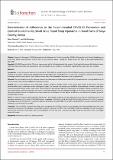| dc.description.abstract | Introduction: In order to prevent and control the spread of COVID-19 in Kenya the Ministry of Health (MoH) issued unprecedented guidelines to be followed by all citizens. Adherence to the MoH COVID-19 prevention and control guidelines in rural areas is generally a function of the residents’ knowledge, attitude, and practices (KAP). Evidence shows that public knowledge is important in tackling pandemics.
Objective: The overall objective of this study was to assess the determinants of adherence to the COVID-19 prevention and control guidelines by the rural small scale shop operators (SSSOs) in Siaya County, Kenya.
Method: This is a cross sectional survey conducted in sixteen randomly selected market centres across Siaya County in May, 2020. The SSSOs were identified using a systematic random sampling technique. One hundred and seventy two rural SSSOs were requested to answer simple semistructured questions posed by the enumerators. The questionnaire assessed demographic characteristics, knowledge, attitude, and practice of the rural SSSOs toward COVID-19 prevention and control. Data were analysed using the Statistical Package for the Social Sciences (SPSS), version 26. Descriptive analysis focused on frequencies and percentages while chi-square test was applied to determine the differences between groups for selected study variables.
Result: The response rate was 100%(172) with male being 71.5%(123) and female 28.5%(49). Majority, that is 32.6%(56) of the SSSOs were in the age group, between 2s1-25. About 32.6%(56) had poor knowledge of COVID-19;(χ2 (4 N= 172)= 25.965, p=. 000), while only 12.2%(21 … | en_US |

